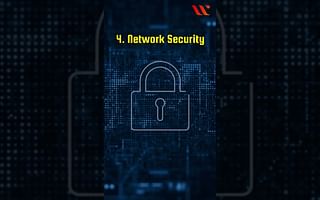Rhett Rowe is a seasoned expert in cybersecurity, boasting over 15 years of professional experience in the industry. He has collaborated with numerous Fortune 500 companies, aiding them in fortifying their digital infrastructures. Rhett is a Certified Ethical Hacker (CEH) and has earned his Master's degree in Information Security from Stanford University.
Hey there! If you're curious about the career path of a cybersecurity specialist, you've come to the right place. As an expert in the field, I'm here to guide you through the steps to becoming a cybersecurity expert and shed some light on the exciting journey ahead.
1. Education and Foundation:
To kickstart your career in cybersecurity, a solid educational foundation is crucial. Pursuing a degree in a related field such as computer science, information technology, or cybersecurity will provide you with the necessary knowledge and skills. Additionally, certifications like Certified Ethical Hacker (CEH), Certified Information Systems Security Professional (CISSP), and CompTIA Security+ can boost your credibility and open doors to more opportunities.
2. Gain Practical Experience:
While education is essential, practical experience is equally important. Look for internships, entry-level positions, or volunteer opportunities in cybersecurity. These hands-on experiences will allow you to apply your knowledge in real-world scenarios, develop problem-solving skills, and build a strong foundation.
3. Specialize and Choose a Path:
Cybersecurity is a vast field with various specializations. Take the time to explore different areas such as network security, penetration testing, incident response, or security engineering. Identify your interests and strengths to determine which path aligns best with your goals. Specializing in a specific area will help you become an expert in that field and stand out from the crowd.
4. Continuous Learning and Skill Development:
Cybersecurity is a rapidly evolving field, so continuous learning is crucial. Stay updated with the latest trends, technologies, and threats by attending conferences, workshops, and webinars. Engage in online communities, join cybersecurity forums, and follow industry experts to stay in the loop. Additionally, hone your technical skills by practicing in virtual labs, participating in Capture The Flag (CTF) competitions, and working on personal projects.
5. Networking and Building Relationships:
Networking plays a vital role in any career, and cybersecurity is no exception. Attend industry events, join professional organizations like the Information Systems Security Association (ISSA) or the International Information System Security Certification Consortium (ISC)², and connect with like-minded professionals. Building relationships can lead to mentorship opportunities, job referrals, and collaborations that can accelerate your career growth.
6. Stay Ethical and Ethical Hacking:
Ethics are at the core of cybersecurity. As a cybersecurity specialist, it's crucial to understand the importance of ethical hacking. Consider pursuing certifications like Certified Ethical Hacker (CEH) or Offensive Security Certified Professional (OSCP) to gain a deeper understanding of ethical hacking techniques and methodologies. Ethical hacking skills are highly valued in the industry and can open doors to exciting career opportunities.
7. Career Progression and Advancement:
As you gain experience and expertise, you can progress in your cybersecurity career. You may start as a cybersecurity analyst, then move up to roles like security engineer, penetration tester, security consultant, or even a Chief Information Security Officer (CISO). Continuously challenge yourself, take on new responsibilities, and seek opportunities for growth and advancement.
Remember, the cybersecurity field is vast and ever-evolving, offering a wide range of opportunities. By following these steps, continuously learning, and staying passionate about your craft, you'll be well on your way to becoming a cybersecurity specialist.
If you have any more questions or need further guidance, feel free to reach out. Happy hacking!















